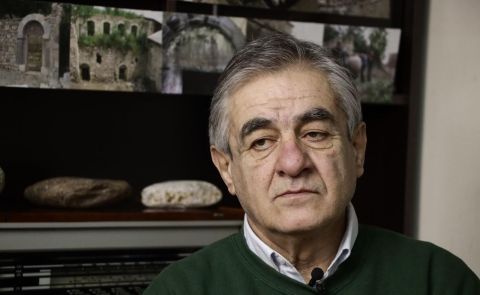
Gallia Lindenstrauss: A Spillover of the Conflict in the Caucasus Cannot Be Excluded

Iran's new president, Masoud Pezeshkian, recently urged the Iranian Revolutionary Guards not to respond to the assassination of Hamas leader Ismail Haniyeh with a direct attack. The British daily Telegraph reported on August 9 that the reformist president suggested countermeasures against Israeli assets in neighboring Azerbaijan. The existence of these assets has never been officially acknowledged, and it is believed that such an attack could have more limited consequences. They might be even less consequential if warning had been given in advance.
This proposal once again brings to the fore the question of the possible spillover of the Middle East crisis into the South Caucasus. In an attempt to assess the Israeli projection of such an eventuality and to put current developments into context, Caucasus Watch turned to Gallia Linderstrauss. Dr. Linderstrauss is one of the leading experts on Israel's evolving relations with Turkey and Azerbaijan. She is a senior research fellow at the Institute for National Security Studies in Tel Aviv and an authority on the region.
Turkish President Erdogan suspended trade relations with Israel in May 2024. This will cost the two countries between $6 billion and $8 billion. Is this the end of the distinction between politics and trade in the region? How does Israel view the Middle Corridor project?
Turkey's decision in May to halt trade with Israel was not driven by rational economic calculations, as three-quarters of pre-war bilateral trade consisted of Turkish exports to Israel. Instead, this move is better explained by domestic and ideological factors. Still, the Israeli-Palestinian conflict, which stirs strong emotions internationally, is a unique case. Many countries, especially considering their economic problems, do pursue a policy that overall is economically sound, at least in terms of their tendency to maintain relationships with existing trade partners. Even in the case of Turkey and Israel, both countries have in essence allowed some trade to continue via third parties. While this doesn't match pre-war levels, it keeps certain trade links alive.
Regarding the Middle Corridor project, there has been little discussion of it in Israel. However, compared to the Northern and Southern corridors, Israel’s preference is clear and aligned with that of Azerbaijan. Since land routes have limited capacity compared to sea routes, there does not appear to be a direct conflict between various current proposals, such as the IMEC, Iraq's Development Road, and the Middle Corridor.
Relatively recently, Azerbaijan opened its Embassy in Tel Aviv. Is the deterioration of relations with Ankara likely to affect relations with Baku, given the “one nation, two states” theorem?
No Muslim-majority country has cut off diplomatic ties with Israel since the war begun on October 7 following Hamas surprise attack on Israel. Despite the trade ban, Turkey has not even downgraded its relations with Israel. In this context, there is no reason to expect Azerbaijan to act differently from other Muslim-majority countries. While Azerbaijan is understandably concerned about the escalating tensions in the Middle East, this only highlights the importance of keeping all communication channels open. In this regard, Azerbaijan is adopting an approach to its relations with Israel that aligns more closely with that of the UAE, rather than Turkey. Unlike Ankara, which imposed a trade ban, Baku is focused on strengthening communication channels and preserving existing ties with Israel. Furthermore, Ankara understands Azerbaijan's strong relationship with Israel, and pressuring Baku to choose between its ties with Israel and Turkey could be a delicate move for Ankara.
The relationship between Azerbaijan and Israel has been referred to as the “iceberg relationship.” There is a military and energy partnership. What is the significance of this partnership and has it been affected at all by current affairs.
The two main pillars of the Israel-Azerbaijan relationship are indeed the energy cooperation and the defense cooperation. The natural gas discoveries off the Israeli shores supply much of its energy needs, but Israel still requires oil imports. Azerbaijan has been a very reliable oil supplier for many years. In the defense realm, Azerbaijan is a major consumer of Israel’s defense products, and both countries view Iranian revisionist ambitions as a very serious threat. In recent years there have been growing economic ties and cooperation in areas such as aviation and tourism and climate change adaptation. Israel-Azerbaijan relations have withstood previous rounds of conflict in Gaza, although clearly the current war is much more intense. The two countries appear committed to maintaining their relationship, and despite the ongoing war, reports indicate that Israel's arms exports to Azerbaijan continue uninterrupted.
The three-state forum formed to debate the future of Syria (Russia-Iran-Turkey) is evolving into a three-plus-three framework to determine the future of the Caucasus. Is this plurinational formation problematic for Israel? For instance, how does Israel position itself vis-à-vis the International North-South Trade Corridor?
The growing alignment between Russia and Iran poses a significant concern from Israel's perspective. Iran also uses some of the trade routes, commercial trucks, aviation, and shipping to smuggle weapon parts to Hezbollah. As a result, Israel is likely to be far more supportive of trade routes initiated by actors with a more Western orientation, or routes passing through countries with friendly relations toward the West. Russia, Iran and Turkey frequently do not see eye to eye on developments of Caucasus. This was recently highlighted by Iran's criticism of Russia for backing Azerbaijan’s (and Turkey's) stance on the Zangezur corridor. In general, Azerbaijan's careful balancing act means it is unlikely to support any solution in the Caucasus that completely sidelines Western actors from the region. Maintaining a diverse set of international partnerships is crucial for Azerbaijan, and excluding the West would undermine its strategic interests. In this regard, Azerbaijan’s interest in maintaining a balance in its foreign relations is an impetus for maintaining its close relationship with Israel.
From an Israeli perspective, is there a potential spill over the crisis with Iran, in the Caucasus. Does the election of a President in Iran regarded as a reformist make a difference at all?
After Iran directly attacked Israel in April 2024, no possibility can be ruled out. Iran has previously attacked Israeli and Jewish targets outside of Israel. While Israeli diplomats abroad are regularly provided with tight security measures, they are under heightened threat from Iran. In August, the IDF instructed all soldiers vacationing or planning to travel to Georgia or Azerbaijan to remain in Israel.
While the identity of the Iranian President is significant, the threat Iran poses to Israel is deep and multi-layered. It would be a mistake to view the conflict in Gaza as detached from Iran and its proxies' broader confrontation with Israel. Since October, Israel has been attacked from seven different fronts, and many Israelis are currently displaced particularly due to the conflict initiated by Hezbollah on Israel’s northern front.
Interview conducted by Ilya Roubanis
See Also


Irina Mamulashvili: Electoral Interference is a Playbook, not a Recipe

Giorgi Gakharia: The EU Should Engage Georgia Despite Its Democratic Backsliding

Peace or Capitulation? Shahverdyan on Armenia-Azerbaijan Agreement and the Nagorno-Karabakh Crisis

Ali Mousavi Khalkhali: Iran Will Avoid Conflict in the Caucasus

